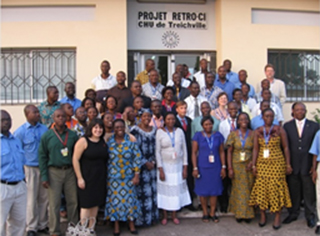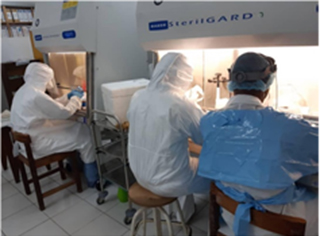Cote d’Ivoire HIV Laboratory Partners with CDC to Chart New Paths in COVID-19 Testing

CDC/Retro-CI staff during a visit from U.S. Global AIDS Coordinator, Ambassador Mark Dybul, 2007
In 1988, CDC began working with Cote d’Ivoire’s Ministry of Health and Public Hygiene (MSHP) to develop critical laboratory capacity in response to the HIV epidemic. This partnership led to the establishment of the Retro-Cote d’Ivoire (CI) laboratory in Abidjan in 1991. Over the past 32 years, Retro-CI has evolved into a reference center for the national laboratory network. Retro-CI now provides life-saving HIV diagnostics to hundreds of thousands of Ivoirians annually, as a result of the collaboration and support from the U.S. President’s Emergency Plan for AIDS Relief (PEPFAR). MSHP and CDC immediately recognized Retro-CI as an essential testing resource for the virus that causes COVID-19.
The CDC-supported Pasteur Institute of Cote d’Ivoire (IPCI) diagnosed the country’s first COVID-19 case in March 2020 (verified by Institut Pasteur in France) and testing for the virus began at IPCI. MSHP then requested Retro-CI’s assistance to scale-up the country’s testing for COVID-19. In May, Minister of Health and Public Hygiene, Dr. Eugene Aka-Aouele, visited Retro-CI to discuss preparation efforts with the CDC staff, and officially launch the COVID-19 testing program.
“I’m very proud to be Ivoirian, given the spirit of partnership we’ve observed here today,” Dr. Aka-Aouele noted. “Our visits to the Pasteur Institute of Cote d’Ivoire and Retro-CI laboratories have illustrated Cote d’Ivoire’s capacity even in the face of a global pandemic, thanks to our efforts to establish critical services at the first signs of the outbreak.”
Complementing IPCI’s efforts, Retro-CI performed approximately 7,000 COVID-19 tests during May–August 2020, representing about 6% of all COVID-19 tests performed in the country during that period. In addition, CDC and Retro-CI staff provided technical assistance to the broader laboratory network on testing protocols and international guidance for biosafety and waste management.
Lab continues to support HIV diagnostic and viral load testing

COVID-19 testing begins at Retro-CI, May 2020
Despite the global COVID-19 pandemic, Retro-CI continues to provide annual viral load testing (a measure of the amount of HIV in a person’s body) to over 35,000 Ivoirians living with HIV and serves as a reference and back-up laboratory for molecular diagnostics in collaboration with the National Public Health Laboratory. Retro-CI also performs over 30% of the nation’s early infant diagnostic tests every year, identifying newborns who might have acquired HIV through mother-to-child transmission during pregnancy, delivery, or post-partum. The laboratory provides HIV genotyping to identify potential drug resistance for persons living with high viral loads.
International inspectors recertified Retro-CI’s international accreditation in October 2020. Accordingly, Retro-CI has signed a memorandum with MSHP to serve as a regional reference and training center for the detection and surveillance of pathogens including influenza, dengue, and yellow fever. The COVID-19 pandemic highlights the importance of having strong laboratory capacity. Retro-CI can address the needs of HIV testing while supporting diagnostic testing of emerging and re-emerging infections.
MSHP will assume laboratory oversight
With support from the President’s Emergency Plan for AIDS Relief (PEPFAR) and a goal of long-term sustainability, CDC has initiated a five-year transition process for the Retro-CI laboratory. During this period, MSHP will gradually assume operational responsibilities for routine HIV diagnostic testing and associated human resources at Retro-CI. CDC will provide ongoing support for more complex testing, including genotyping and drug-resistance testing for HIV.
Retro-CI will continue to provide technical support for quality assurance, testing of new and emerging germs (such as the virus that causes COVID-19), and routine testing for public health surveys and surveillance activities. The U.S. government’s high-impact partnership with Cote d’Ivoire’s MSHP, as well as the technical and financial investments, enabled the establishment of the Retro-CI, a sophisticated institution serving the public health needs of the nation.
With international accreditation, Retro-CI has become a reference center for the West African region. Leveraging the gains and experience from the PEPFAR program to support the national COVID-19 response represents adaptive and innovative use of CDC’s support to national public health programs and serves as a foundation for broader gains in the future. With the five-year transition plan underway, CDC and MSHP are working together to ensure that this national success story continues to effectively serve the public health needs of the Ivoirian and West African population.